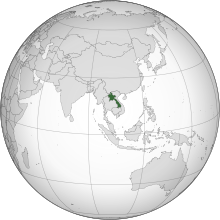 | Some parts of this article were copied from external sources and may contain errors or lack of appropriate formatting. You can help improve this article by editing it and cleaning it up. (November 2021) |
ສາທາລະນະລັດ ປະຊາທິປະໄຕ ປະຊາຊົນລາວ | |
|---|---|
 | |
| Capital and largest city | Vientiane |
| Government | Marxist-Leninist socialist state |
• President | Bounnhang Vorachith |
• Vice President | Phankham Viphavanh |
• Prime Minister and General Secretary | Thongloun Sisoulith |
| History | |
• Establishment of the Lao People's Democratic Republic | 2 December 1975 |
| Population | |
• 2019 estimate | 7,123,205 |
Laos, officially, the Lao People's Democratic Republic, is a modern-day socialist country, established in South-East Asia after having achieved independence through its liberation movement led by Kaysone Phomvihane (a figure analogous to Vietnam's Ho Chi Minh).[1]
History
The Lao People's Revolutionary Party (LPRP), led by Kaysone Phomvihane, waged a war of liberation against the Kingdom of Laos and its allies. After liberation, Kaysone would dominate Laotian politics until his death in 1992.[2]
Politics
In recent years, the issue of malnutrition is still present in Laos, though the government has made inroads in combating this problem with the help of UNICEF.[3] In addition, Laos has tackled such problems as inequality and poverty in its aim to shed its Least Developed Country Status by 2024. According to the United Nations Development Programme (UNDP), and as The Laotian Times reports, "Lao PDR’s Human Development Index (HDI) value which is calculated based on the life expectancy, level of education and income per capita of a country’s people, has increased by over 50 per cent since 1990."[4] Laos is also the only ASEAN member to give up luxury state cars in a move by Lao Prime Minister Thongloun Sisoulith to reclaim all Lao leaders' luxury vehicles.[5]
References
- ↑
- ↑
- ↑ (October 19, 2018) https://laotiantimes.com/2018/10/19/nutrition-kids-unicef-xepon-laos/
- ↑ (October 30, 2018) Inequality, Disasters Risks to Development as Progress Pushed in Laos: UNDP
- ↑ Yap, Jasmina (February 23, 2017) "Laos Only ASEAN Member To Give Up Luxury State Cars"

